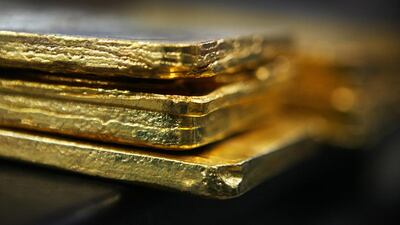Business Editor Mustafa Alrawi discusses the big stories, including the largest fine imposed in the DFSA’s history and what a rising UAE population says about the economy.
Scrutiny on Kaloti good for Dubai’s gold trade
On Monday, the Dubai Multi Commodities Centre said that it had removed the Kaloti jewellery group’s Sharjah-based gold refining subsidiary from its “Good Delivery” list, amid concerns of where it has been sourcing the yellow metal. The standards are there to combat money laundering and curb the export of gold from conflict zones. The decision will ultimately be good news for Dubai’s ambitions to become the world’s leading gold hub and which, in 2013, traded some US$75 billion of the precious commodity, accounting for 40 per cent of the international total. Kaloti is a critical part of helping achieve this goal with its plans for a new $60 million refinery in the emirate, set to be one of the world’s largest, with capacity to refine up to 1,400 tonnes of gold and up to 600 tonnes of silver. Once it comes through this rigourous period of scrutiny, Kaloti should be beyond reproach. This will ultimately strengthen Dubai’s reputation and position in the minds of gold traders and investors.
Construction sector the biggest employer in the UAE
More than 4.4 million people were working in the country last year, according to Ministry of Labour data, released on Wednesday. This is an increase of 10 per cent compared to 2013 and shows that the economy continues to expand. The statistics also highlight that the construction sector employs around a third of this number. The figures give added weight to what we already know - that the health of the economy is directly related to the number of property, infrastructure and industrial projects being developed. This year’s outlook remains strong according to business publication Meed which said on Tuesday that $172bn worth of project contracts are forecast to be awarded in the GCC, eclipsing 2014’s record year, with the UAE accounting for around $40bn of that figure.
Dubai housing costs continue to rise
A new survey this week from the Dubai-based home services comparison site MoveSouq.com showed that 82 per cent of residents in the emirate said they have experienced an increase in their rental costs when they last renewed their rental contracts. The survey contradicts the data coming out of property firms this year showing a small dip in housing costs. So, where is the disconnect? It most likely comes from the reality that the decision to move home can come down to emotional factors as much as financial. The idea of staying can often be more appealing even if you pay more given the pitfalls of moving including the associated costs. Equally a landlord is unlikely to be moved by statistics if he or she believes they can get away with a higher rent - they have nothing to lose by trying. If the tenant goes then the next one in line will probably pay even more. Only a big change in market forces, typically where supply outweighs demand, can alter this entrenched dynamic.
DFSA fines Deutsche Bank
Dubai’s offshore financial regulator flexed its muscles on Wednesday when it slapped Deutsche Bank with an $8.4m fine - the largest ever penalty imposed by the DFSA - for “serious contraventions” of its rules at its wealth management business. The Dubai sanction echoes a series of similar moves by regulators across the world’s leading financial centres that began in the wake of the financial crisis, with hundreds of billions of dollars of fines now levied on financial institutions. The wave of penalties has resulted in the creation of a new but no less damaging self-serving culture at international banks where the fear of huge penalties has shifted the balance of power in favour of compliance departments. The latter are focused on what regulatory problem may come down the pipe next rather than the welfare of customers and clients. While customers have traditionally always taken a back seat to the priorities of the institution they bank with, until recently it had been because they got in the way of making money, not because providing services to them risked more regulatory fines. Pictured, the DIFC.
Samsung hopes for the hype
Korean group Samsung warned on Wednesday that there could be supply issues for its flagship Galaxy S6 smartphones. Some 22,000 handsets have been sold in the UAE alone according to the local distributor Eros since its launch on Friday. However, analysts point to the marketing trick that Apple typically pulls where the perception of scarcity can drive sales up. It seems Samsung may be taking a leaf out of its fiercest rival’s playbook with their pronouncements of “difficulties for the short term, we will do our utmost to secure enough supply for our global consumers”. Retailers here are less bullish but admit that they will likely sell out of the relatively small amount of stock they have been given. We will have to wait to see if the buzz generated is enough to help Samsung retake the mantle of world’s leading smartphone maker from Apple.
malrawi@thenational.ae






